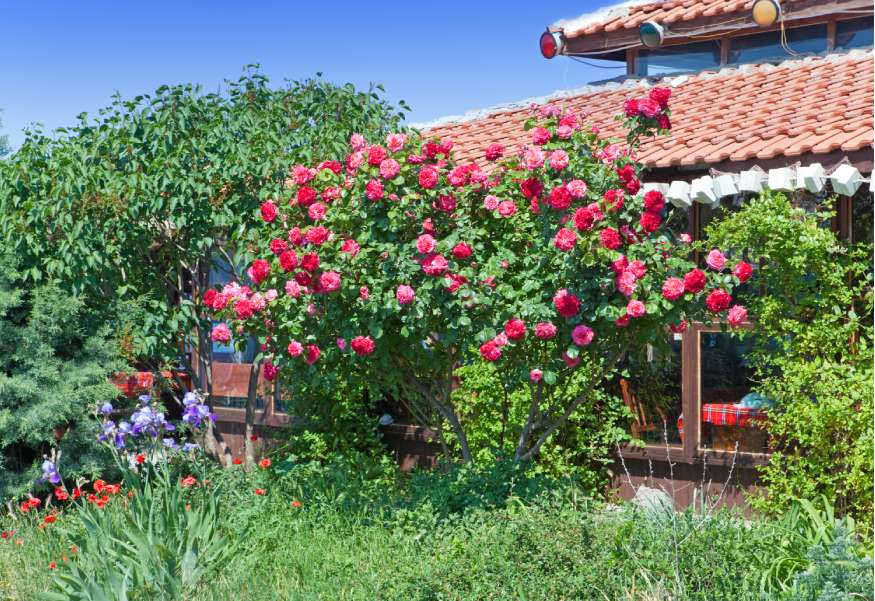Roses are undoubtedly one of the most beloved flowers across the globe. With their exquisite beauty and captivating fragrance, they have become a symbol of love, romance, and elegance. However, like all living things, roses have a limited lifespan. We will learn all about the interesting world of roses and answer the important question, “How long do roses last?”
Roses are one of the most popular and beautiful flowering shrubs, prized for their elegant blooms and lovely fragrance. But how long do these iconic plants actually live? The lifespan of a rose bush can vary quite a bit depending on the variety, growing conditions, and care. Here’s a guide to rose bush longevity so you know what to expect from your roses.
Rose Bush Life Expectancy
In general, most modern rose varieties will live between 6-10 years. However, with good care and proper growing conditions they can certainly exceed that lifespan.
- Modern hybrid teas, floribundas, and shrub roses typically live 6-10 years.
- Old garden roses and antique varieties often live over 20 years.
- Hardy shrub roses and landscape roses tend to be the longest lived, some reaching 50+ years.
- Climbing roses and ramblers can also have very long life spans of 30-50+ years.
So while the average modern rose bush may only live around a decade, many roses will outlive that range with proper care and maintenance. The oldest rose bushes on record have attained ages of 100 years or more!
Factors Affecting Longevity
Several key factors affect how long rose bushes will live:
Rose Type
The type of rose makes a big difference in lifespan. Very generally old garden roses and hardy shrub roses tend to be the longest lived. Modern hybrids especially hybrid teas, have shorter average lifespans of 6-10 years. But there can be a lot of variation even within types.
Growing Conditions
Roses thrive best in zones 5-9. Hot humid climates can decrease rose bush lifespan. Providing good air circulation, proper sunlight fertile well-draining soil and sufficient water will all promote longevity.
Pruning and Care
Good rose bush care pays off! Regular pruning, fertilizing, pest/disease management, winter protection, and watering will keep roses healthy and enable them to live to their full potential lifespan. Neglect shortens life expectancy.
Environmental Factors
Harsh environmental conditions take a toll on roses. Extreme cold, drought, heavy rainfall, diseases, and pests can all negatively impact rose bush health and shorten lifespan if not properly managed.
Maximizing Rose Bush Longevity
Here are some tips to help your rose bushes achieve maximum longevity:
-
Select long-lived varieties – Choose rose types known for their longevity like old garden roses, shrub and landscape roses.
-
Provide ideal growing conditions – Give your roses full sun, nutrient-rich well-draining soil, ample water, and good air flow.
-
Prune properly – Prune roses at the right times to encourage blooms and maintain plant shape and vigor.
-
Fertilize regularly – Feed with a balanced rose fertilizer to nurture growth and flowering.
-
Monitor for pests – Watch for common rose troubles like Japanese beetles, aphids, and spider mites.
-
Treat disease issues promptly – Common rose diseases include black spot, powdery mildew, and rust.
-
Protect in winter – In cold zones, wrap or mound the graft union and canes to insulate them.
-
Water sufficiently – Give roses at least 1-2 inches of water per week, more in hot, dry weather.
Signs of Aging Rose Bushes
As rose bushes mature and age, you may notice:
- Less vigorous growth and smaller leaves
- Stems becoming thicker and woodier
- Loss of leaves and dieback of stems
- Smaller blooms and less frequent flowering
- More susceptibility to diseases and pests
These are normal signs of aging. But with some rejuvenation pruning and care, older bushes can keep going strong for many more years.
Reviving Old Rose Bushes
Here are some tips for reviving tired, old rose bushes:
-
Prune aggressively – Cut back old stems to promote vigorous new growth.
-
Fertilize – Feed roses to encourage strong growth. Compost/manure also helps.
-
Improve soil – Amend soil with compost or other organic matter to replenish nutrients.
-
Transplant if needed – Move roses to a sunnier spot or replace poor soils if necessary.
-
Water and mulch – Ensure roses get sufficient water to support growth. Mulch retains moisture.
-
Monitor pests/disease – Control any problems to prevent added stress on roses.
-
Protect canes in winter – Insulate graft unions and canes from cold damage.
With some rejuvenation care, most rose bushes can keep thriving for many more years beyond their average lifespan. Proper maintenance and care from the start will give your roses the best chance at growing happily for decades to come!
How long do roses last in a bouquet?
When arranged in a bouquet, roses typically last around 5 to 7 days. However, this can vary depending on the freshness of the roses and the care they receive.
Can I make roses last longer by adding aspirin or other substances to the water?
Adding aspirin or other substances to roses does not work to make them last longer, according to scientific evidence. Following proper care techniques, such as trimming the stems and changing the water regularly, is more beneficial.
How long should my ROSE live?
FAQ
How many years can a rose bush last?
What is the average lifespan of a rose?
What is the oldest living rose bush?
- A Complete Guide to Caring for Yuki Cherry Blossom Shrub - January 23, 2025
- Identifying Red Hot Poker Seeds: What to Look For When Harvesting Torch Lily Pods - January 23, 2025
- A Complete Guide to Harvesting Evening Primrose Seeds - January 23, 2025

